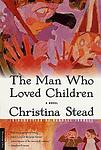Christina Stead
Christina Stead (1902–1983) was an Australian writer and novelist known for her rich prose and psychological insight. Her best-known work, 'The Man Who Loved Children', is considered a modern classic and explores the complexities of family life. Stead's writing often tackled social and political issues, and she gained critical acclaim for her literary contributions.
Books
This list of books are ONLY the books that have been ranked on the lists that are aggregated on this site. This is not a comprehensive list of all books by this author.
-
1. The Man Who Loved Children
This novel explores the complex dynamics of the Pollit family, focusing on the relationship between the egotistical patriarch Sam and his idealistic daughter Louie. Set in Washington D.C. during the 1930s, the story provides a stark portrayal of a dysfunctional family, where Sam's delusional optimism and insensitivity clash with Louie's growing disillusionment and rebellion. The narrative delves into themes of family conflict, emotional abuse, and the struggle for individual identity within the confines of family expectations.
-
2. The Little Hotel
"The Little Hotel" is a novel that revolves around the lives of the guests and staff of a small Swiss hotel post-World War II. The narrative delves into the interactions, secrets, and complexities of its diverse characters, who range from exiles and refugees to tourists and the hotel's proprietors. Through a series of vignettes, the book paints a vivid picture of the human condition, exploring themes of displacement, identity, and the search for stability in a rapidly changing world. The hotel serves as a microcosm of society, where personal dramas and the echoes of global events intermingle, revealing the nuanced tapestry of post-war Europe.
-
3. Cotters' England
"Cotters' England" is a novel that delves into the life of Nellie Cotter, an actress and radical thinker living in post-war England. Through Nellie's experiences and relationships, the book explores the complexities of political activism, personal identity, and societal change. Set against the backdrop of a country grappling with the aftermath of conflict and the rise of socialism, the narrative weaves through themes of love, betrayal, and the struggle for personal and political integrity. The protagonist's passionate and often tumultuous journey offers a sharp critique of the social and political landscape of the time, revealing the challenges faced by those who dare to envision a different world.


